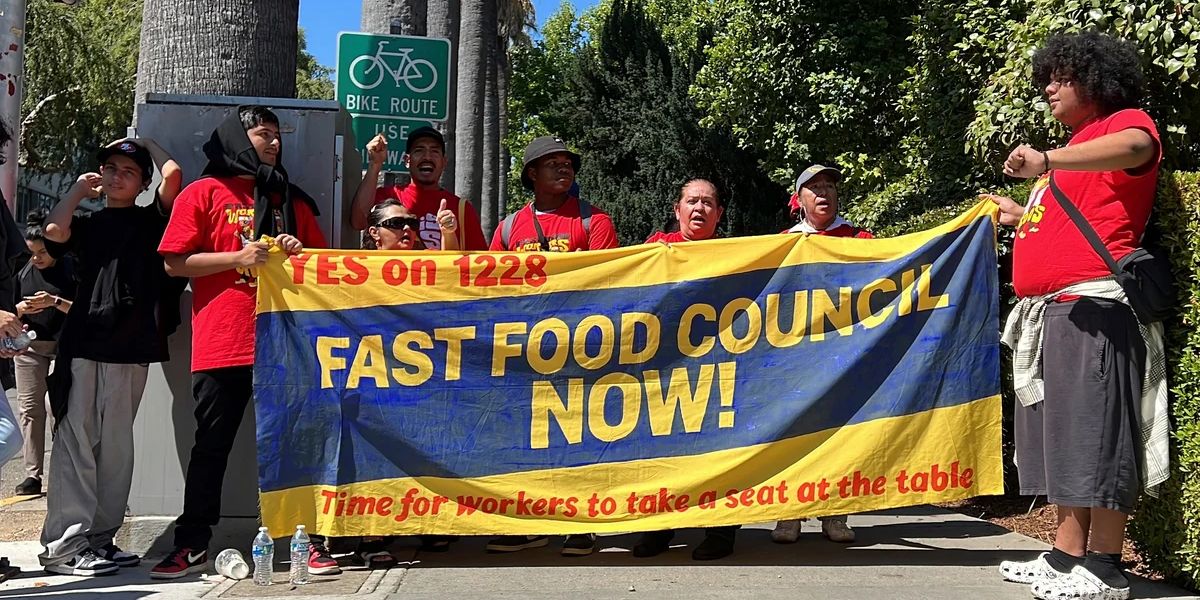California Fast-food Workers Urge for $20.70 Minimum Wage by 2025; Seek Better Job Security and Address Industry Abuses
Fast-food workers in California are once again pushing for a minimum wage rise, barely four months after receiving their last $4 raise. The workers argue that the prior raise is insufficient to meet the state’s rising cost of living, especially because many workers report that their working hours have been reduced as a result of the recent wage increase.
How Much More Are California’s Fast-food Workers Demanding?
The California Fast Food Workers Union (CAFFWU), which is associated with the Service Employees International Union (SEIU), announced a fresh set of demands at the state’s Fast Food Council’s inaugural meeting.
According to a statement sent by the SEIU to KTLA 5 News, the CAFFWU is requesting that workers’ salaries be boosted to $20.70 per hour by January 1, 2025, “to keep up with the rising cost of living.”
Before the recent $4 hike that raised their minimum hourly salary to $20 last April, fast-food workers in California earned $16 per hour. Along with the proposed pay increase, the CAFFWU also called for improved job security, timely compensation for back pay, consistent work schedules for employees, and a thorough investigation into what they call “pervasive abuses” in the fast-food industry, such as wage theft, harassment, discrimination, and hazardous working conditions.
“As California’s fast-food industry grows, cooks and cashiers are doubling down on their fight across the state to win safe and healthy stores, stable hours, pay that keeps up with inflation, and training to understand their rights on the job,” according to the SEIU statement.
How Have California’s Fast-food Restaurants Handled the New $20 Minimum Wage for Workers?
According to The New York Post, since California adopted the new $20 minimum wage for fast-food workers in April, roughly 10,000 jobs have been lost as struggling franchisees try to cut labor expenses and boost prices to stay in business.
To counterbalance rising labor costs, major chains such as McDonald’s, Burger King, and even the low-cost In-N-Out Burger have raised menu prices. Many businesses have also lowered labor hours and hastened their transition to automation.
Rubio’s California Grill was the first big chain to succumb to the financial strains of the new law, closing 48 of its almost 134 sites by the end of May. The San Diego-based company blamed these closures on the “rising cost of doing business” in the state, and it filed for bankruptcy in June.
Jot Condie, President and CEO of the California Restaurant Association, which opposed AB 1228, emphasized the impact of rising rents and food prices on companies. “When labor costs jump more than 25% overnight, any restaurant business with already-thin margins will be forced to reduce expenses elsewhere,” Condie told me.
“They don’t have a lot of options beyond increasing prices, reducing hours of operation, or scaling back the size of their workforce.”
Fast-food firms have shared the council’s worry about rising operational costs. An Arby’s franchisee told the council, “I’ve been compelled to hike rates. I try to do my best. This last quarter, I used my savings to make things work. But I’m not sure how long I can keep doing it.”
Although the implementation of the new $20 minimum wage for fast-food workers has resulted in over 10,000 job cuts, the SEIU and Newsom’s office stated that thousands of jobs have become available since the pay increase went into effect last April.
While it is unclear whether the request for an additional pay raise will be granted, fast-food employees who have not been touched by the recent string of layoffs in California applaud the new prospective wage boost.
“It’s been really good because I can put more food on the table and in my fridge while also paying my rent on time, which was always a challenge,” said Romualda Alcazar Cruz, a Wendy’s employee in Oakland.

